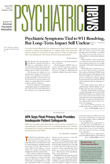The need for training in disaster psychiatry became glaringly apparent after last year’s terrorist attacks. Now, some New York area training programs have made room for the education that residents need to help victims of trauma.
New York University’s (NYU) training program in psychiatry, like many others, taught residents about trauma before the World Trade Center towers fell. The institution’s affiliation with the New York Veterans Administration Medical Center ensured that residents had experience with posttraumatic stress disorder (PTSD), but the department’s affiliation with Bellevue Hospital has provided yet another way for residents to learn about trauma.
Since 1995 the Bellevue/NYU Survivors of Torture Program has been providing treatment and rehabilitative services to survivors of political torture and their families. Since the program’s inception, its staff at the program have cared for more than 500 people from 50 countries.
It is not uncommon for patients in the program to have survived genital mutilation, electrocution, or starvation.
According to Ze’ev Levin, M.D., associate director of residency training in psychiatry at NYU, some of the patients have been tortured because of their religion, sexual orientation, or ethnic background.
He told Psychiatric News that after last year’s terrorist attacks, several residents at NYU expressed interest in and began working with patients in the Survivors of Torture Program. Subsequently, program staff developed a series of lectures for PGY-3 psychiatry residents.
NYU has also added a course for psychiatry residents on disaster outreach in psychiatry since September 11.
“Never has it seemed as important as now to reassess theories of trauma, to understand how the brain and body respond to it, explore the fears of bioterrorism and a future attack, and learn how to provide counsel from its pain,” said Levin.
At Beth Israel Medical Center in New York City, funding from the Greater New York Hospital Association has enabled experts in disaster psychiatry to educate faculty and residents about disaster psychiatry.
David Teitel, M.D., who is physician-in-charge of outpatient psychiatric services and educational coordinator for PGY-3 residents in psychiatry, said that the funding, received last March, enabled the department to form a disaster specialist team. The department also purchased a library of literature on trauma and paid for outside experts to teach residents and faculty about treating victims of trauma.
“The emphasis on training is often on treating adults living with varying degrees of trauma stemming from childhood and adolescence,” said Teitel. “I think that a specific focus on the short-term aftermath of trauma has not been emphasized.”
For the past 10 years, residents at Columbia University have been learning about the many aspects of traumatic stress, according to Lisa Mellman, M.D., who is associate director of psychiatry residency training. After 9/11, residents learned how to use cognitive-behavioral therapy to treat patients with PTSD and benefited from seminars on terrorism and PTSD.
Noting that a number of institutions such as schools and hospitals created disaster plans in response to 9/11, Mellman urged that residents be included in formulating and implementing disaster response plans. She said that formal training in residency should be focused on “providing treatment for those in need after an acute disaster has taken place.” ▪
